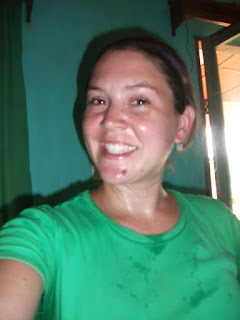Alright, now that I’m back in the blogging game, y’all will have to let me know what kinds of topics you’d like me to cover. Sometimes I find it a little difficult to come up with subjects because for better or for worse, a lot that I would have found fascinating/alarming/quaint a year ago has become normal or even vaguely hackneyed. It’s a curious feeling to talk to my parents each week and sometimes feel I have nothing to really say. Just the same old, same old: waking up to an obnoxious rooster or the call to prayer, dodging motorcycles at the market, asking the same kid to call me “madam” instead of “batoure,” going on a usually fruitless search for care packages or letters at the post office, and kids waving to me when they should be focusing on other tasks (use your imagination). Despite some of these things forming my new normal, my amazing friend Kimie often poses the very valid question, “what are our lives here?” It’s hard to put succinctly, but I’ll try: frenzied, stressful, sweaty, beautiful.
In truth, 85% of the time, our lives are pretty darn good. Although Peace Corps supposedly pays us only enough to live at the same level as our work partners, most of us make more, and most of us have a surplus at the end of the month. We make somewhere around $8/day; our rent’s paid, and we have free healthcare. In reality, most of us can fund vacations (within West Africa at least) on our living allowance if we are conscientious savers. My biggest extravagances are canned diet soda, which runs about the equivalent of a dollar, and paying someone to do my laundry (about two dollars a week).
We’ve just hit the eight-months-in-country mark. (Seventeen and a half more to go!) I realized the other day when my friend Matt offered, as a thank you, to make me anything I wanted for dinner, that pretty much everything I miss from home is of the intangible variety. (I suppose I wouldn’t consider myself a foodie, so that helps. I can find all of my favorite foods here in Benin.) Anyway, Matt’s making waffles because it reminds me of Sunday mornings with my mom and dad, waiting for our truly ancient and potentially flammable waffle maker to serve us up some empty carbs. It’s not the waffles I miss, of course. So allow me to get this out of my system so I can move on.
Things I miss from amerique/la-bas:
1. Not having to worry about having enough small change. It can be incredibly hard to break bills here, even the one milles (the equivalent of $2). I have three vendors I visit almost daily: Baguette Guy, Rice and Beans Maman, and the Tofu Wives. They would rather let me pay “on credit” if I don’t have exact change. They know I’ll come back the next day and will pay then.
2. Silence. There’s just never not something noisy going on, screaming infants in particular.
3. Schedules, particularly with public transport. Imagine what would happen if the L didn’t leave until people were shoved into every square inch of each car. Ha ha ha. I’m pretty sure people would riot and Rahm Emmanuel would not get re-elected. Side note: yesterday in my taxi, four adults, including the driver, sat in the front row of a sedan the size of a Honda Civic. It’s normal.
4. Clean air. Burning tires has been a thing in my neighborhood lately.
5. Anonymity. I still kinda don’t feel bad for celebrities because they’re getting paid significantly better than I am, but I guess we both asked for this.
Okay, I feel better now. Funny random story: apparently one of the embassy employees had to leave the country quite suddenly (personal reasons?), so the contents of her pantry were divided among the four PC workstations. I walked into mine the other day to discover about twenty rolls of paper towels, Febreze, eight cans of canned chicken, a can of clams, beets, plastic cups from Costco, and, my favorite, a sack of flour from Target. Huh? Clearly one of the best benefits of working for the embassy is the free shipping of food/random supplies from America, but flour? Last time I checked, you can get kilos of it in the market. And yeah, it’s little bit of jealousy speaking, but why get paper towels when you surely had household help? The mind, it boggles.
Stay tuned, s‘il vous plait.






